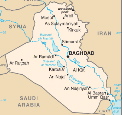MAYSAN PROVINCE, Iraq -- A Royal Air Force Merlin helicopter swoops low over the marshes of southern Iraq, over the heads of fishermen poling narrow boats along winding channels. Reeds bend and water ripples under the chopper's rotor blast. The fishermen shield their eyes to gaze up at the roaring machine. It's a typical encounter in the remote province of Maysan on the border with Iran. Here, more than 10,000 crude fishing boats ply the wetlands that straddle the border, providing sustenance to hundreds of thousands of Shiite "Marsh Arabs" who populate teeming villages that aren't marked on any map. The deeply tribal Marsh Arabs move freely between Iraq and Iran. For the British and federal Iraqi forces whose jobs it is to intercept smuggled weapons and foreign infiltrators, the Marsh Arabs are a persistent headache. And for American pundits back home, they represent the middle swath of a radical Islamic "Shiite crescent" with one end in Iran and another in Hezbollah-controlled southern Lebanon.
Fears of Iran Meddling in Southern Iraq Appear Overblown

